
Ancient Anglican
A Modern Perspective on Early Christian Thought.
New on the Blog
The Prophetic Imagination – Criticism and Pathos in Jesus of Nazareth
It is Jesus’s crucifixion that is his decisive criticism of the royal consciousness that must have order. Jesus was not killed by the rabble but by the religious and political authorities of the day.
The Prophetic Imagination – Prophetic Energizing and the Emergence of Amazement, pt.2
Into this abyss of suffering, the prophet of hope and amazement begins to speak with the words “Comfort ye, comfort ye, my people, saith your God.” Isa. 40:1. Jeremiah’s Rachel who refuses to be comforted (Jer. 31:15), has been answered.
The Prophetic Imagination – Prophetic Energizing and the Emergence of Amazement, pt.1
The working example (which I assume Brueggemann had in mind in 1978) of this penetration of despair, is the civil rights movement, and specifically, Martin Luther King, Jr.’s “I Have a Dream” speech:
The Prophetic Imagination – Prophetic Criticizing and the Embrace of Pathos, pt.2
Jeremiah also grieves because, like Isiah, he is speaking to a people who simply cannot and who simply refuse to hear. The Royal Consciousness has closed the ears to hear the words of the prophet.
The Prophetic Imagination – Prophetic Criticizing and the Embrace of Pathos, pt.1
At a more fundamental level, Brueggemann writes that prophetic critique must be grounded in pathos. He points out that the royal management consciousness that is rooted in practicality and reasonableness leads to apathy, or the denial of experience, emotions, empathy, and imagery.
The Prophetic Imagination – Royal Consciousness, pt.2
He writes that Israel exchanged freedom for order, justice for security, and passion for satiation. The royal consciousness stands against any change. It saps our capacity and readiness to care and suffer for others, and to block out the cries of those who do.
The Prophetic Imagination – Royal Consciousness, pt.1
Under Solomon, the politics and religion of Israel become well-ordered. But this transition is not a God-ordered society but a royal-ordered society. In our consciousness, like Israel, we do not want God’s order, we want our order with ourselves in control.
The Prophetic Imagination – The Alternative Community of Moses, pt.2
Finally, the prophetic energy always ends in doxology not ideology. It ends with praise to the God that acted decisively for the outsider as the outsider, not so that the outsider could now become the oppressor.
The Prophetic Imagination – The Alternative Community of Moses, pt.1
The initial example that Bruggemann uses to speak about the world and the prophetic imagination to both criticize the world and to energize an alternative vision is Pharoah and Moses. If you have time this week, read Exodus 1-3 and see where the Scriptures describe the world versus the prophetic alternative.
The Prophetic Imagination – Introduction
In short, the prophetic imagination is understanding (or imagining) God’s acting outside of the boundaries that we have placed around him.
Epiphany – The Transfiguration, Mark 9:2-13, pt.2
The word Mark uses for “transfiguration” is metamorphoses, the title of Ovid’s poem. In Mark’s use of this term, like his use of the word “gospel” to open his work, he wants us to see that Jesus is Lord and God, not Ceasar.
Epiphany – The Transfiguration, Mark 9:2-13
The Transfiguration shows us Jesus’ metamorphosis from an itinerant preacher and healer in Galilee into the fullness of his purpose and being as the Messianic Son of God to be crucified in Jerusalem as the ransom for many.


